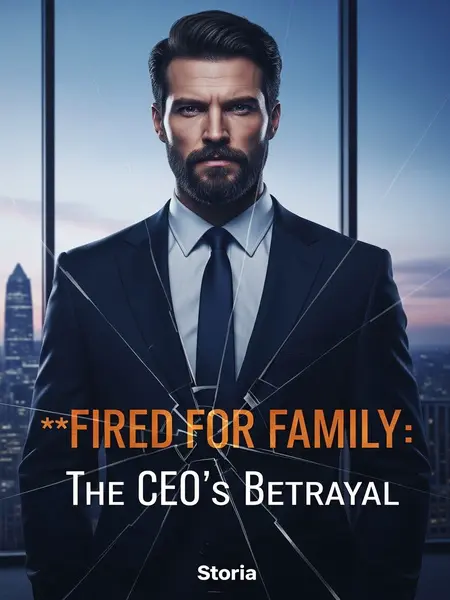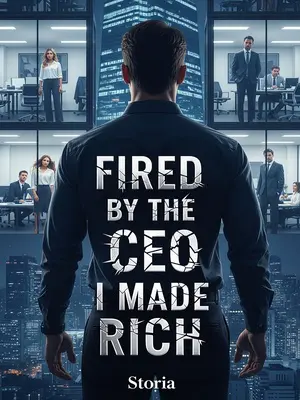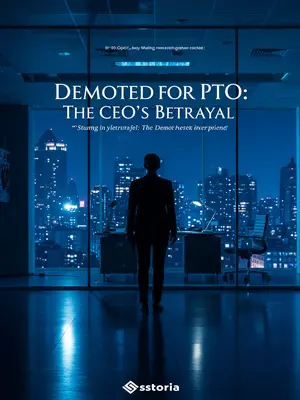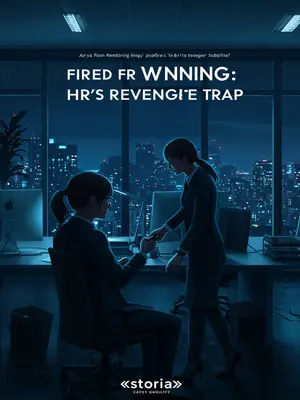Chapter 5: The Last Stand
Back at my cramped desk, I suddenly felt I’d been too naïve.
The open-plan floor buzzed with phone calls and muted laughter. I was just another body at a borrowed workstation, nothing left but a box of personal effects and a head full of regrets. I stared at my old office—already claimed by someone else.
I always thought that solid work and results would speak for themselves, but I still got played by Bill.
Hard work had always been my armor. But in the end, it wasn’t enough. Loyalty, numbers, sweat—none of it mattered against the Jensen family name.
The most ridiculous part? Just days ago, I’d been telling my team about a bright future, only to get blindsided myself.
I pictured myself at that grill, raising a glass to next year, promising a future I’d never get to see. It was almost comical—if it hadn’t hurt so much.
But thinking of them, I immediately pulled out my phone.
I couldn’t let them get caught in the crossfire. At the very least, I owed them a warning.
I planned to remind them to quickly submit any invoices I’d signed before my transfer order came down, to avoid trouble later.
I started typing out a text, thumb hovering over the send button. Time was tight, and I didn’t want anyone else to get burned by the fallout.
But before I could dial, a business partner I was close to called first.
The screen flashed with his name—Travis Porter, owner of a steel supply outfit in Macon. We’d been through the trenches together, building trust one late-night order at a time.
"Jake, did something happen at your company?"
His voice was raw, strained. I could tell he was holding back more than he let on.
He’s a straight shooter, and though his tone was tense, I could tell he was holding back his anger for my sake.
That was Travis all over—loyal, but never one to sugarcoat the truth.
I asked what was going on.
He said the regular payments still hadn’t come through. He’d gone to our company to ask finance, but they said my signature was now useless, and that payment needed headquarters approval. They even hinted that nothing would get paid until after New Year’s.
His words landed like a slap. I could picture his shop, the line of trucks waiting on checks that weren’t coming. The man had mouths to feed, too.
"Man, we’ve worked together a long time. When you were in a hurry, I worked overtime for you."
"Before, if you said when I’d get paid, that’s when I got paid. I gave you my best."
"Now it’s year-end, and I’ve got over a hundred people waiting to go home. You can’t leave me hanging."
His frustration was justified. I felt it like a weight in my chest. Out here, reputation is everything—and Travis was putting his on the line for me.
My heart sank. This guy had always treated me well.
Loyalty like that doesn’t come cheap. I wasn’t about to let him down if I could help it.
When the project started, to speed things up, I’d stayed in the plant with him day and night. He’d made huge contributions to the new project.
I remembered those early days—eating bad vending machine sandwiches, pulling all-nighters to hit deadlines. Travis was always the last to leave, the first to show up. He deserved better than this.
After thinking for a moment, I said, “Don’t worry. I’ll be at headquarters these next two days, and I’ll make sure your issue gets resolved.”
I promised, and meant it. I knew it might be my last real act in the company, but I wouldn’t leave a friend twisting in the wind.
"Okay, Jake, I trust you. I’ll wait for your good news."
His faith stung. I made a silent vow not to let him down, no matter what it cost me.
After hanging up, I took a deep breath.
The air felt heavy, like a thunderstorm was coming. But for the first time all day, I knew exactly what I needed to do.
It was clear they’d planned this for a while—moving fast and showing no mercy.
The pieces all fit. I was just the latest in a line of casualties. But if they thought I’d go quietly, they were mistaken.
At this point, my mind was clear.
All the bitterness, all the shock—they burned away, leaving only resolve. If nothing else, I’d make sure my people and partners got what they were owed.
I was sure his company wasn’t the only one in this situation.
Stories like mine play out all over the country—good people tossed aside for family politics or quarterly targets. I wasn’t special, but I could still do the right thing on my way out.
Bill was cutting off all my connections, so that when his nephew took over, all the goodwill would be transferred to the new boss.
It was a clean sweep—erase my influence, rewrite the story. But relationships can’t be reassigned like parking spaces.
But do they really think I’m a pushover?
They’d underestimated me. I wasn’t leaving without a fight—not for myself, but for the people who trusted me.
In business, as in life, I’ve always believed in doing right by people and never screwing over friends or partners.
That was the code I lived by—hard-earned and uncompromising. The suits upstairs might forget that, but the folks on the ground never do.
Since I’d lost all hope for the group, I at least wanted to wrap up all unfinished business before leaving.
If my reputation was all I had left, I was going to protect it. One last sweep through the company, making sure no one else got caught in the crossfire.
I immediately called Zach, my marketing manager.
Zach picked up on the first ring, his voice tight. “What’s up, boss?”
I told him to contact all our business partners and make sure they submitted all payment documents within the next two days, or they’d have to wait until after New Year’s.
He understood right away. "Got it. I’ll call everyone before noon." Loyalty like that doesn’t fade, even in crisis.
After giving instructions, I headed straight to the group finance department.
My boots echoed on the linoleum as I marched down the hallway. The door to finance was half-open, the usual chatter replaced by a tense hush. I straightened my tie and stepped inside.
Finance director Lillian Howard was also related to Bill, so she definitely knew everything.
She was perched behind her oversized desk, reading glasses halfway down her nose. She looked up, lips pressed in a thin line, not surprised to see me.
Luckily, she didn’t avoid me.
I shut the door behind me, ignoring the looks from her assistants. This was going to be a showdown, and we both knew it.
I got straight to the point:
"The year-end is coming. Settle all my payments. I’m leaving the company."
No pleasantries, no small talk. My voice was steady—a final demand.
At first, Lillian pretended not to understand.
She arched an eyebrow, as if I’d just spoken another language. "Excuse me? What payments?"
"Mr. Turner, what are you talking about?"
I said, no need to play dumb. Project finance told me approval rights had been taken back by the group. Such a big change and no one told me—why play games?
She fiddled with her pen, the act growing thin. I wasn’t leaving until I got answers.
Lillian looked embarrassed, but finally dropped the act.
She set the pen down, folding her hands on the desk. The mask slipped just enough to show the stress lines beneath.
"That’s not my department, Jake. HR’s handling your exit—finance has its own rules. Besides, you know the group’s situation. Funds need to be coordinated, so the group had to centralize."
She delivered it with a practiced air, like a judge handing down a sentence. But I wasn’t buying it.
I sneered at her performance.
Her tone was pure corporate, but I could see the calculation in her eyes. She was measuring how much noise I might make.
"Director Howard, that wasn’t the rule before. I haven’t been officially transferred yet—I’m still the general manager of the project company, right?"
"The project company is a wholly-owned subsidiary with independent financial authority."
"The company’s cash flow is positive, with millions in the account. If you want to transfer it back, you can’t bypass me, right?"
"If you block my payments and suppliers sue, is that malicious default or illegal transfer?"
My words were slow, deliberate. I wanted her to know I understood the stakes. She squirmed in her chair, the bravado fading.
Lillian’s face darkened, and she finally dropped the pretense.
She tapped her pen so hard it left dents in the legal pad. I matched her stare, refusing to blink first.
"Mr. Turner, are you threatening the company?"
She glared, but I didn’t blink.
"You’re so eager to get suppliers paid, trying to wrap things up—are you after one last kickback?"
The accusation was so outlandish, it almost made me smile. "Is pettiness a family trait?" I shot back.
"Director Howard, is pettiness a family trait?"
"Check all you want. I’m not afraid of anything. Every penny is aboveboard."
"But as for the group’s accounts, I wonder if every expense can withstand scrutiny."
The room grew very still. I watched her fingers tremble just slightly.
"You…"
Lillian turned pale with anger, but finally softened.
She took off her glasses, pinching the bridge of her nose. It was clear the stress was getting to her.
"I have to report this to Bill. I can’t decide."
Her voice was small, uncertain. For the first time, I saw her as something other than an obstacle—a cog in a much larger machine.
"Two days. I’ll submit all expenses and payments I handled for your review and payment, then I’ll sign off and leave."
I made my terms clear, my patience spent. I wasn’t leaving without closing things out properly.
With that, I turned and walked out.
I didn’t look back. My boots echoed down the hallway, one step closer to the exit.
As I left, I heard her pick up the phone.
As I stepped into the hallway, her voice trailed after me—panic rising. Let Bill know: I’m not done yet.













